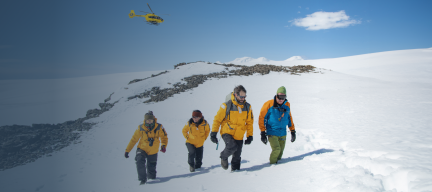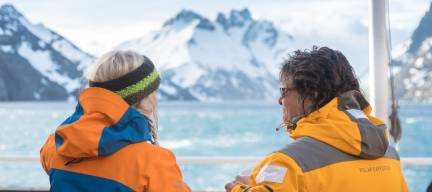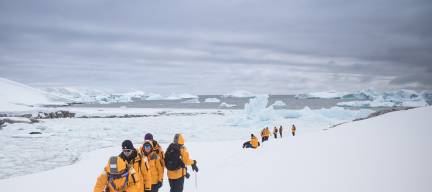Environmental sustainability is a universal concern not only for Quark Expeditions® staff and crew, but for our passengers, as well. Exploring the pristine Polar Regions calls for the utmost respect, so we can preserve them for generations to come.

That’s why we’ve partnered with tour operators, tourists and the government of Svalbard to support Clean Up Svalbard, an initiative designed to help preserve and clean up some of the stunning and unique wilderness of the Norwegian archipelago between mainland Norway and the North Pole.
As an active participant in the program, we engage passengers on beach debris cleanups during our Spitsbergen trips.
Challenges to Environmental Sustainability in Svalbard
The Arctic is increasingly subjected to waste and debris washing up on its shores – an eyesore that mars the pristine land and seascapes of the Far North. Even worse, that garbage poses a serious threat to wildlife, such as the seabirds that abound on Bear Island, the archipelago’s southernmost island.
Home to hundreds of thousands of arctic seabirds, including little auks, thick-billed guillemots, northern fulmars and black-legged kittiwakes, the island, whose only human residents work at the meteorological station, has been designated an Important Bird Area by Bird Life International. Seabirds are particularly susceptible to problems caused by plastic pollutants, which can cause entanglement or, if ingested, ulcers, infection or death. Chicks are the most vulnerable, since they are unable to regurgitate the debris.

Also posing a constant threat to the region’s seabirds and delicate underwater ecosystems are fishing nets and ropes, as northerly ocean currents transport debris from around the world into Arctic . We support the Underwater Bait Setter program in the Antarctic for this reason, but you can still promote sustainability initiatives in the Arctic by participating in cleanups.
Explore Spitsbergen: Download Your Destination Guide
Clean Up Svalbard on Your Arctic Adventures
Every summer, residents, tourists and volunteers take to local beaches to collect plastic, glass and other potentially harmful debris. Over the last decade, they’ve collected and disposed of tons of refuse!
Quark staff are passionate about these cleanups and invite passengers to participate whenever possible. Depending on when you visit, you may be able to contribute to a cleanup in or around Longyearbyen, the world’s northernmost city and the archipelago’s largest settlement.
In fact, you can explore plenty of beaches during our 13-day Spitsbergen Circumnavigation expedition, where, if conditions are favorable, we attempt to circumnavigate the entire archipelago. Remember that trash is the only thing you can take with you – driftwood, rocks, wooden objects and cultural remains are treasures that must be left undisturbed.
Support Environmental Sustainability in Polar Regions
Clean Up Svalbard is one of the sustainability initiatives we’re proud to support. We’re also a Silver Sponsor of Polar Bears International, a fantastic organization committed to polar bear advocacy, education and conservation, and a dedicated supporter of the South Georgia Heritage Trust, which is helping to restore South Georgia’s natural habitat by eradicating harmful rodents from the island. Plus, we actively support and promote the Penguin Lifelines project spearheaded by penguinologist Dr. Tom Hart, who traveled on a series of Quark expeditions in 2015 and early 2016 to do fieldwork across Antarctica.

Most important, we support your desire to make a difference in your travels by participating in a lifestyle that promotes sustainability, conservation and responsible tourism. Contact an experienced Polar Travel Adviser today to learn more about the initiatives you can become involved with during your arctic adventures.
Photos courtesy of Quark passengers.
Want to learn more about planning your own Spitsbergen expedition?
- Read more Spitsbergen expedition stories from expedition experts and travelers like you
- Get your Spitsbergen Destination Guide
- Download your free Spitsbergen Explorer: Wildlife Capital of the Arctic brochure









